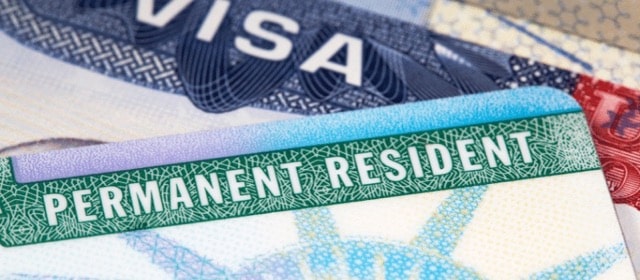As a family law firm that operates in Texas, we often have clients ask us green card divorce questions. Some people want to know how long do you have to wait to get a divorce after you get a green card, while others wonder what will happen to their kids if they get deported. We also see cases where a party from another country takes children shared with a U.S. citizen back to their home country without the U.S. citizen’s permission.
Divorce and child custody cases involving citizens of different countries can get complicated. Not only do you have different legal systems and governments to contend with, you also have geographic challenges, especially if one of the parents flees with the child outside of our borders. In addition, immigrants with temporary green cards have to worry about how a divorce will affect their immigration status.
Consult both a divorce and immigration attorney if you want a conditional green card divorce
While our Texas divorce lawyers specialize in issues pertaining to family law, like divorce and child custody cases, we do not specialize in immigration law. Consequently, when we have clients come to us who are either not a naturalized citizen of the United States or they are married to someone with a green card, we believe it is critical to involve an immigration attorney.
Immigration attorneys can provide insight for green card marriage divorce and child custody issues, when one of the party’s immigration status is in question. They can also advise on best steps for getting a green card with permanent residence status (also known as a 10-year green card or permanent green card) for parties who received a conditional green card after marrying a U.S. citizen.
According to U.S. Citizenship and Immigration Services (USCIS), conditional green cards only last two years, and a party married to a U.S. citizen must apply to remove restrictions on permanent residence within 90 days prior to the expiration date of a conditional green card.
If a party wants to get a divorce after conditional green card is obtained, or they want to find out what happens if you get divorced before green card is obtained, an immigration attorney can explain what steps would be required to avoid deportation, if possible. This may include filling out required forms within a certain timeline and meeting specific conditions mandated by the U.S. government.
If your fear you may be in danger if you return to your home country, are likely to experience immense hardship if deported or have experienced domestic violence at the hands of your U.S. citizen or permanent green card spouse, your immigration attorney can help. He or she can explain what evidence you need to build a compelling case to obtain a permanent green card and avoid deportation because the burden will be on you to prove your claims.
Can I divorce after getting a 10-year green card?
Many of the questions our Fort Worth family law firm gets regarding green card divorce involve timing. These include, how long do you have to wait to get a divorce after you get a green card, and can I divorce after getting a 10-year green card. (In Texas, yes you can.) When it comes to timing and divorce green card scenarios, laws vary from state to state.
The civil courts here in Texas don’t look at naturalized citizenship when it comes to divorce. In Texas, there is a minimum 60-day waiting period to get divorced, from date of filing to finalization of divorce (though it can take longer than that) but it doesn’t matter whether you are a naturalized citizen or not. Generally, anyone who meets residency requirements and the minimum 60-day waiting period can get a divorce in Texas.
In fact, you do not have to be a naturalized citizen to bring any type of lawsuit in the state of Texas, which may be surprising to some. How can you sue and get benefits and rights under civil courts if you don’t have your green card? People do it every day.
I’ve also seen cases where a party is on immigration hold status, where they’re going to get deported, and it’s known to the courts. We don’t see the bailiff arresting people in these situations, as they are not Immigration and Customs Enforcement (ICE). And even if you do call ICE, they generally don’t show up at the courts, unless crimes have been committed or a seriously bad actor is involved.
At the same time, we all know the United States takes immigration violations very seriously. USCIS wants to make sure immigrants are not trying to enter and remain in this country under false pretenses. If someone files for divorce prior to getting a 10-year green card (during the two-year conditional green card period), that could raise red flags as to whether the party entered into marriage in good faith or to gain entry into the U.S., along with the many privileges that come along with holding a green card in this country.
I know many people asking these green card divorce timing questions are wondering how getting a divorce will affect their immigration status. They want to know, what happens if you marry a U.S. citizen and then divorce? Again, it’s best to consult an immigration attorney to find out how a divorce will affect one’s ability to keep their green card, stay in the United States and even attain U.S. citizenship, especially if they haven’t obtained a permanent green card yet.
How Texas family courts deal with custody issues when a parent has a green card
If you bring a matter of child custody to the Texas family courts, immigration status is typically irrelevant, unless one of the parties is deported or one of those really bad actors. Ultimately, the court wants to determine what arrangements would be in the best interest of the child.
Some parents think they can weaponize the fact that the other parent has a green card or is not a naturalized citizen, in order to get the custody schedule they want. Texas courts don’t deal with custody disputes that way, in fact, they don’t appreciate it when those arguments come up.
I’ve never seen a judge say, “You’ve got your green card, and you guys are getting divorced, you’re probably not going to get citizenship (or you’re illegal), so therefore we’re not going to give you primary custody.” The courts push the green card or citizenship issue to the side and see what the parties have been doing, which makes it an irrelevant point.
What you generally see in these scenarios, is the court will consider the facts in the case and look at who has been providing what care and support for the child—just like they would in a traditional custody case where both parents are U.S. citizens. If one parent gets deported at a later date, they will deal with the issue at that time.
I know some parents also worry about what will happen to their children if they are deported. Again, it’s important to consult both a child custody attorney and an immigration attorney to find out what rights you have regarding your children if you do get deported. ICE does have policies and standards in place for detained parents but it can be difficult to navigate custody issues once a parent is no longer in the U.S.
Be proactive when children are involved and citizenship or a green card is an issue
You never want to get to the point where the other parent of your children leaves the country with your kids. I’ve seen situations occur where a parent is not allowed to stay in this country, so they pack up the children and leave. Unfortunately, it can be immensely difficult for the parent to comply with custody orders because of their citizenship issues. And if a parent is not allowed back in the U.S., it can also be very challenging to get the children back into the country.
A few years back actress Kelly Rutherford, a United States citizen, lost custody of her two children in an international custody dispute. The father of the children, German businessman Daniel Giersch, had to leave the U.S. after his work visa was revoked, so he decided to take his children to live with him in Monaco. A multi-year custody battle ensued, but a California judge’s ruling that it was in the best interest of the children to stay in Monaco with Giersch, who was awarded full custody, was eventually upheld in 2015. International custody disputes are rarely easy, and as with this case, they can take years to resolve.
If you’re concerned about the other parent leaving the country with your children, what can you do? The first step is to speak to a child custody attorney who has experience dealing with international custody issues when citizenship issues are involved.
Your child custody lawyer can help you establish visitation and access guidelines and put provisions in place like travel restrictions, geographic restrictions and passport restrictions. That way, you at least have recourse if the other parent makes an attempt to flee with your kids or be able to engage the legal system if they violate your custody orders in other ways.
Whenever custody issues are involved, I always believe it’s important to put a roadmap in place early on. You want to get legal custody orders filed, so both parents are clear on what their parental rights, duties and obligations include, as well what they are permitted and not permitted to do regarding the children. We also like to make the orders crystal clear when it comes to what remedies will be involved if a parent violates any stipulations in the orders.
If you’re getting a divorce after green card has been obtained, you can handle those issues inside of the divorce, starting with temporary orders, and then eventually in the final divorce decree. For parents who are not married, you can file a SAPCR (suit affecting the parent child relationship) to get custody provisions put in place.
Get legal advice about child custody and divorce green card issues
As noted previously in this blog, it’s important to get insight from both a divorce attorney and an immigration attorney if you or your spouse are not a U.S. citizen and you are contemplating divorce. The divorce lawyers at the Sisemore Law Firm regularly work in tandem with immigration lawyers on cases involving green card divorce and child custody issues.
If you live in the North Texas metroplex and are looking for a divorce attorney Fort Worth or Dallas, we can answer your questions about divorce and child custody and also recommend an immigration attorney to help with your case.
The best way to get started with your permanent or conditional green card divorce is to schedule a confidential case review with an attorney at our firm. During the consultation we will review the facts and issues in your case and explain what strategy we would recommend to best achieve your divorce and child custody goals. From there, we can help you coordinate next steps with an immigration attorney as well.
To schedule your confidential case review with a lawyer at the Sisemore Law Firm in Fort Worth, please call the firm at (817) 336-4444 or schedule your consultation online.
Photo Source: Canva.com





